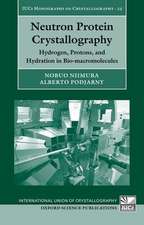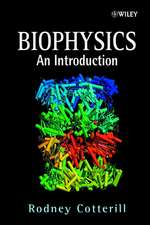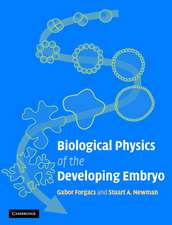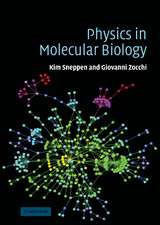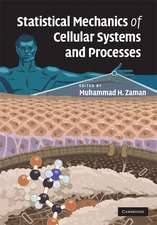Large-Scale Quantum-Mechanical Enzymology: Springer Theses
Autor Greg Leveren Limba Engleză Paperback – 15 oct 2016
| Toate formatele și edițiile | Preț | Express |
|---|---|---|
| Paperback (1) | 634.18 lei 6-8 săpt. | |
| Springer International Publishing – 15 oct 2016 | 634.18 lei 6-8 săpt. | |
| Hardback (1) | 640.24 lei 6-8 săpt. | |
| Springer International Publishing – 25 iun 2015 | 640.24 lei 6-8 săpt. |
Din seria Springer Theses
- 18%
 Preț: 997.88 lei
Preț: 997.88 lei -
 Preț: 389.88 lei
Preț: 389.88 lei - 15%
 Preț: 646.94 lei
Preț: 646.94 lei - 18%
 Preț: 943.43 lei
Preț: 943.43 lei -
 Preț: 399.29 lei
Preț: 399.29 lei - 18%
 Preț: 944.99 lei
Preț: 944.99 lei - 15%
 Preț: 636.80 lei
Preț: 636.80 lei - 18%
 Preț: 941.05 lei
Preț: 941.05 lei - 15%
 Preț: 643.16 lei
Preț: 643.16 lei - 15%
 Preț: 642.68 lei
Preț: 642.68 lei - 18%
 Preț: 1103.62 lei
Preț: 1103.62 lei - 20%
 Preț: 558.83 lei
Preț: 558.83 lei - 18%
 Preț: 1112.30 lei
Preț: 1112.30 lei - 18%
 Preț: 944.19 lei
Preț: 944.19 lei - 18%
 Preț: 1109.92 lei
Preț: 1109.92 lei - 18%
 Preț: 1217.27 lei
Preț: 1217.27 lei - 15%
 Preț: 640.06 lei
Preț: 640.06 lei - 15%
 Preț: 636.45 lei
Preț: 636.45 lei - 15%
 Preț: 640.06 lei
Preț: 640.06 lei - 15%
 Preț: 640.88 lei
Preț: 640.88 lei -
 Preț: 389.70 lei
Preț: 389.70 lei - 20%
 Preț: 563.91 lei
Preț: 563.91 lei -
 Preț: 393.35 lei
Preț: 393.35 lei - 15%
 Preț: 637.93 lei
Preț: 637.93 lei - 15%
 Preț: 641.85 lei
Preț: 641.85 lei - 18%
 Preț: 1225.94 lei
Preț: 1225.94 lei - 20%
 Preț: 551.36 lei
Preț: 551.36 lei - 18%
 Preț: 1229.10 lei
Preț: 1229.10 lei - 15%
 Preț: 639.25 lei
Preț: 639.25 lei - 18%
 Preț: 999.45 lei
Preț: 999.45 lei - 15%
 Preț: 640.06 lei
Preț: 640.06 lei - 18%
 Preț: 1220.45 lei
Preț: 1220.45 lei - 18%
 Preț: 1116.26 lei
Preț: 1116.26 lei - 18%
 Preț: 1110.72 lei
Preț: 1110.72 lei - 18%
 Preț: 1000.87 lei
Preț: 1000.87 lei - 18%
 Preț: 891.17 lei
Preț: 891.17 lei - 15%
 Preț: 640.06 lei
Preț: 640.06 lei - 5%
 Preț: 1154.07 lei
Preț: 1154.07 lei - 15%
 Preț: 635.96 lei
Preț: 635.96 lei - 15%
 Preț: 640.88 lei
Preț: 640.88 lei -
 Preț: 387.20 lei
Preț: 387.20 lei - 18%
 Preț: 1109.92 lei
Preț: 1109.92 lei -
 Preț: 385.25 lei
Preț: 385.25 lei -
 Preț: 385.25 lei
Preț: 385.25 lei - 18%
 Preț: 1112.30 lei
Preț: 1112.30 lei - 18%
 Preț: 999.45 lei
Preț: 999.45 lei -
 Preț: 386.99 lei
Preț: 386.99 lei - 15%
 Preț: 637.13 lei
Preț: 637.13 lei - 20%
 Preț: 554.21 lei
Preț: 554.21 lei - 20%
 Preț: 555.59 lei
Preț: 555.59 lei
Preț: 634.18 lei
Preț vechi: 746.09 lei
-15% Nou
Puncte Express: 951
Preț estimativ în valută:
121.37€ • 126.24$ • 100.19£
121.37€ • 126.24$ • 100.19£
Carte tipărită la comandă
Livrare economică 14-28 aprilie
Preluare comenzi: 021 569.72.76
Specificații
ISBN-13: 9783319369471
ISBN-10: 3319369474
Pagini: 165
Ilustrații: XVII, 148 p. 30 illus., 12 illus. in color.
Dimensiuni: 155 x 235 x 9 mm
Greutate: 0.25 kg
Ediția:Softcover reprint of the original 1st ed. 2015
Editura: Springer International Publishing
Colecția Springer
Seria Springer Theses
Locul publicării:Cham, Switzerland
ISBN-10: 3319369474
Pagini: 165
Ilustrații: XVII, 148 p. 30 illus., 12 illus. in color.
Dimensiuni: 155 x 235 x 9 mm
Greutate: 0.25 kg
Ediția:Softcover reprint of the original 1st ed. 2015
Editura: Springer International Publishing
Colecția Springer
Seria Springer Theses
Locul publicării:Cham, Switzerland
Cuprins
Introduction.- Proteins, Enzymes and Biological Catalysis.- Computational Techniques.- Validation Studies.- Explaining the Closure of CHOMO-LUMO Gaps in Biomolecular Systems.- A Density-Functional Perspective on the Chorismate Mutase Enzyme.- Concluding Remarks.
Recenzii
“The dissertation is beautifully written in clear, precise language. It reads, in fact, almost as a textbook, providing in successive chapters the history, theory, and computational methods as background, then proceeding to discussing a validation computation followed by a detailed analysis of the importance of analyzing boundary conditions, then concluding with an analysis based on total use of DFT, and final thoughts. Anyone interested in this area can learn a great deal from this work.” (G. R. Mayforth, Computing Reviews, April, 2016)
Notă biografică
Greg Lever obtained a first class M.Sc in Theoretical Physics from University College London (UCL) followed by a Ph.D. in Computational Enzymology at the Cavendish Laborator, University of Cambridge. He is now Postdoctoral Associate at the Massachusetts Institute of Technology (MIT) in the Department of Chemical Engineering.
Textul de pe ultima copertă
This work establishes linear-scaling density-functional theory (DFT) as a powerful tool for understanding enzyme catalysis, one that can complement quantum mechanics/molecular mechanics (QM/MM) and molecular dynamics simulations. The thesis reviews benchmark studies demonstrating techniques capable of simulating entire enzymes at the ab initio quantum-mechanical level of accuracy. DFT has transformed the physical sciences by allowing researchers to perform parameter-free quantum-mechanical calculations to predict a broad range of physical and chemical properties of materials. In principle, similar methods could be applied to biological problems. However, even the simplest biological systems contain many thousands of atoms and are characterized by extremely complex configuration spaces associated with a vast number of degrees of freedom. The development of linear-scaling density-functional codes makes biological molecules accessible to quantum-mechanical calculation, but has yet to resolve the complexity of the phase space. Furthermore, these calculations on systems containing up to 2,000 atoms can capture contributions to the energy that are not accounted for in QM/MM methods (for which the Nobel prize in Chemistry was awarded in 2013), and the results presented here reveal profound shortcomings in said methods.
Caracteristici
Nominated as an outstanding PhD thesis by the University of Cambridge, UK Establishes linear-scaling density-functional theory (DFT) as a powerful tool for understanding enzyme catalysis Reviews techniques capable of simulating entire enzymes at the ab initio quantum-mechanical level of accuracy Includes supplementary material: sn.pub/extras





